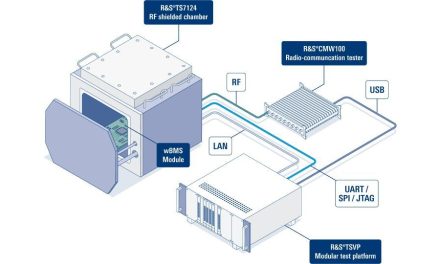 Peregrine Semiconductor, founder of RF SOI (silicon on insulator) and working in advanced RF solutions, has introduced the UltraCMOS PE42424 high-isolation, SPDT switch optimised for 802.11ac carrier and enterprise Wi-Fi access points. Successor to last year’s PE42423, the upgraded switch is 75% smaller and features a 60% increase in power handling and a 350% faster switching speed. The PE42424 is ideally suited for transmit/receive switching applications for outdoor Wi-Fi access points that require high power handling and rugged, high-temperature performance. Peregrine’s RF switch enables these WLAN products to realise the promise of 802.11ac, which is offering high data throughput in increasingly dense, bring-your-own-device (BYOD) environments.
Peregrine Semiconductor, founder of RF SOI (silicon on insulator) and working in advanced RF solutions, has introduced the UltraCMOS PE42424 high-isolation, SPDT switch optimised for 802.11ac carrier and enterprise Wi-Fi access points. Successor to last year’s PE42423, the upgraded switch is 75% smaller and features a 60% increase in power handling and a 350% faster switching speed. The PE42424 is ideally suited for transmit/receive switching applications for outdoor Wi-Fi access points that require high power handling and rugged, high-temperature performance. Peregrine’s RF switch enables these WLAN products to realise the promise of 802.11ac, which is offering high data throughput in increasingly dense, bring-your-own-device (BYOD) environments.
“Wi-Fi is by far the cheapest way to deliver mobile data, so, at a worldwide level, the deployment of Wi-Fi access points is accelerating,” said Joe Madden, founder and principal analyst at Mobile Experts.” More than 1.8 million 802.11ac access points will be deployed next year, including both indoor and outdoor applications. In addition, most indoor small cells will also include Wi-Fi access-point hardware for seamless integration of Wi-Fi with mobile services. The wide bandwidth, high power and demanding linearity requirements of these access points drives a strong need for higher RF-component performance.”
Carriers have been experiencing an exponential increase in mobile data traffic. To provide consistent quality of service, they are offloading this traffic to Wi-Fi networks, which are increasingly integrating 802.11ac into their small cells. Indoor units (IDUs) were the first Wi-Fi access points to adopt the 802.11ac standard, and Peregrine’s inaugural Wi-Fi switch, the PE42423, was optimised for high performance within those devices. Today, outdoor unit (ODU) Wi-Fi access points are quickly adopting the 802.11ac standard, and their performance and environmental requirements are much more intensive. Peregrine developed the PE42424 to meet these specific 802.11ac-based ODU access point needs:
· High power handling of 8W to accommodate the higher transmit power of the access-point radios
· Fast switching speed of 145 ns to enable higher throughput and data rates in high-density, BYOD environments
· High port-to-port isolation to reduce signal leakage between transmit and receive paths
· Temperature support up to 105 degrees Celsius to withstand harsh environments and to reduce thermal constraints
· Small 1.5×1.5 mm footprint to reduce board area and offer engineers more design options for other functions
“Peregrine is extending its Wi-Fi RF switch line to address the tough challenges faced by designers of next-generation 802.11ac access points,” said Kinana Hussain, senior marketing manager. “Our UltraCMOS technology and patented design techniques preserve the isolation performance of PE42424’s predecessor while increasing the power-handling capability, improving switching speeds and reducing the form factor.”
Peregrine’s PE42424 supports the latest carrier-grade, Wi-Fi device demands with additional features, including:
· High linearity of 61 dBm IIP3 over the entire power-supply range; this capability enables system designs with lower supply rails and prevents linearity degradation through maximum power levels
· High ESD rating of 2500V (on RF pins) that increases product reliability and eases manufacturing flow
· Smaller switch footprint that eliminates the need for external components, such as DC blocking capacitors
· Control logic support for 1.8V and 3.3V and wide power supply range from 2.3V to 5.5V that provides design flexibility



